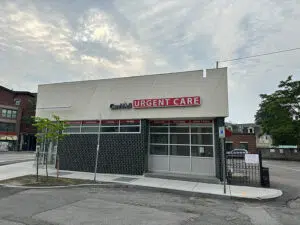Understanding UTIs and Their Symptoms
Urinary tract infections (UTIs) are one of the most common bacterial infections. In the United States alone, they are the second most common type of infection in the body and the reason for over 8 million visits to primary care offices and urgent care centers each year.
While they are much more prevalent in women (affecting 50-60% of all women), approximately 3 in 25 men will have symptoms of a urinary tract infection during their lifetime. They can occur in the bladder, urethra, or kidneys and may cause discomfort that interferes with daily activities.
Common UTI symptoms include:
- Constant “need to go” sensation
- Feeling as though you are unable to empty your bladder fully
- Sudden urges to urinate
- Persistent lower abdominal pain
- Pain when urinating
- Urine that is cloudy, foul-smelling, or contains blood
While you can help ease symptoms at home by increasing your liquids (e.g., water and cranberry juice), most UTI treatments include a course of antibiotics.
While mild cases may start with subtle signs, untreated infections can worsen quickly. If you or a loved one are experiencing these symptoms, you may be asking yourself, “Can I go to urgent care for a UTI?” The answer is yes.
Why Urgent Care Makes On-Site UTI Testing Easy
At CareWell Urgent Care, we offer high-quality urgent care for urinary tract infections. If you or your child are showing symptoms, our pediatric urgent care team and adult providers are here to help with fast, accurate diagnosis and treatment.
We make it simple to get the answers you need with urgent care UTI testing available every day. Our on-site testing process allows us to quickly analyze urine samples and confirm infection during your visit. If needed, we can prescribe an antibiotic for UTI to shorten the UTI duration and get you feeling better right away.
Our urgent care testing services are designed for both convenience and accuracy, so you don’t have to wait days for results. You can come to any of our centers—no appointment necessary—for same-day testing and treatment.
What Causes UTIs (and How to Prevent Them)
Here are eight UTI causes—along with a few UTI prevention tips to help you reduce your risk and protect your urinary health year-round:
- Sexual activity
The motion from sexual intercourse can transfer bacteria from the bowel or vaginal cavity into the urethra. You can lower your risk of urinary tract infection by doing the following:- Stay hydrated before sex
- Urinate (pee) within 15 minutes of sex
- Gently cleanse the area around (not inside) your urethra and vagina with plain warm water soon after sex
- Avoid tight clothing after sex to discourage bacteria growth
- If you struggle with recurrent infections, ask your doctor about a post-sex prophylaxis medication to help prevent UTI recurrence
- Feminine care products
Feminine products like pantyliners, pads, and tampons can trap more heat and moisture than underwear. If you need these products, change them regularly (about every 3-4 hours) to stay fresh and avoid excess bacteria, which can lead to UTI. - Holding your pee
Holding your urine for six hours or more can increase your risk of UTI. Bacteria that can stay in your bladder for too long have time to overgrow, increasing your risk of infection. As a rule of thumb, we recommend voiding (peeing) once every 3-4 hours. - Dehydration
Staying hydrated helps dilute your urine and lowers the concentration of bacteria in the bladder. We recommend drinking at least 50 ounces of fluid daily to help prevent UTI symptoms. - Constipation
Constipation makes it difficult to fully empty your bladder, which means trapped bacteria have lots of time to overgrow and increase your risk of infection. - Diarrhea
Bacteria from bowel movements can make their way into your vagina and urethra. To help avoid this, wipe from front to back every time you use the bathroom. - Uncontrolled diabetes
Diabetes is a chronic disease that occurs when your blood glucose (blood sugar) is too high. High blood sugar creates a favorable environment in your bladder for bacterial overgrowth and UTIs. - Kidney stones
Kidney stones are small, hard clumps of minerals and acid salts that stick together in concentrated urine. These clumps increase your risk of getting a UTI because they can block the urinary tract, giving bacteria plenty of time to grow.
How Quickly UTIs Recover with Treatment
An untreated UTI can last for several weeks or more. Moreover, if the infection spreads, you have an increased risk for more severe health conditions like a kidney infection.
That’s why seeking urgent care services for UTI treatment is so important.
With proper UTI treatment, many patients feel relief from discomfort within 48 hours, though full recovery usually takes 3–7 days. Untreated infections can last much longer and may require more intensive care if they spread.
If pain is disrupting your day, ask us about over-the-counter options to help with burning and urgency while your antibiotic for UTI works. If symptoms worsen or you develop back pain, fever, or nausea, you may be advised to visit an emergency room immediately to avoid complications.
Fast UTI Care—Walk-in or Save Your Spot
UTI discomfort can escalate quickly and the faster you can begin antibiotics for UTI, the better.
That’s why our walk-in urgent care centers across Massachusetts and Rhode Island are open seven days a week. You can find a location near you or walk in for same-day testing and treatment.
We treat all ages with the same compassion and urgency. Don’t let urinary tract infections slow you down—visit CareWell today for fast relief and expert care.
In addition to treating urinary tract infections, we can help with a variety of conditions and ailments. Learn more about the symptoms treated at urgent care.












